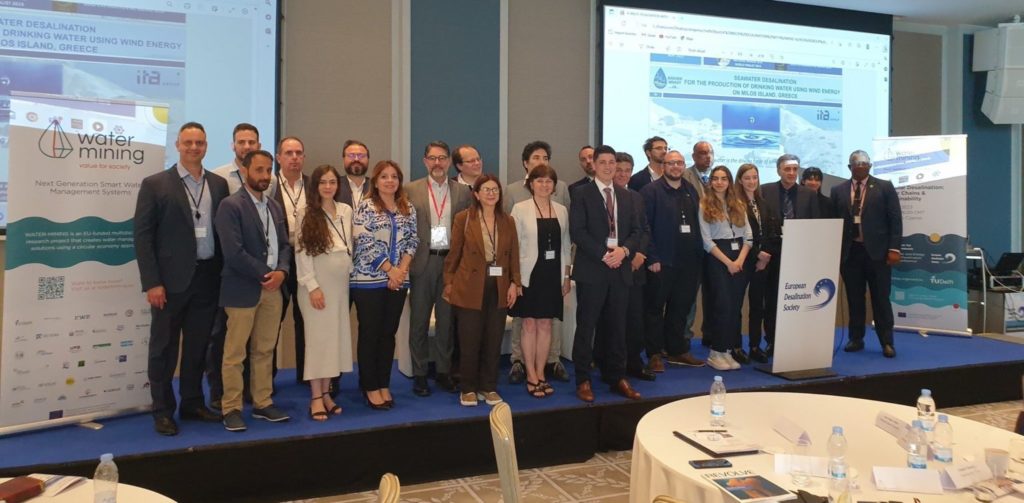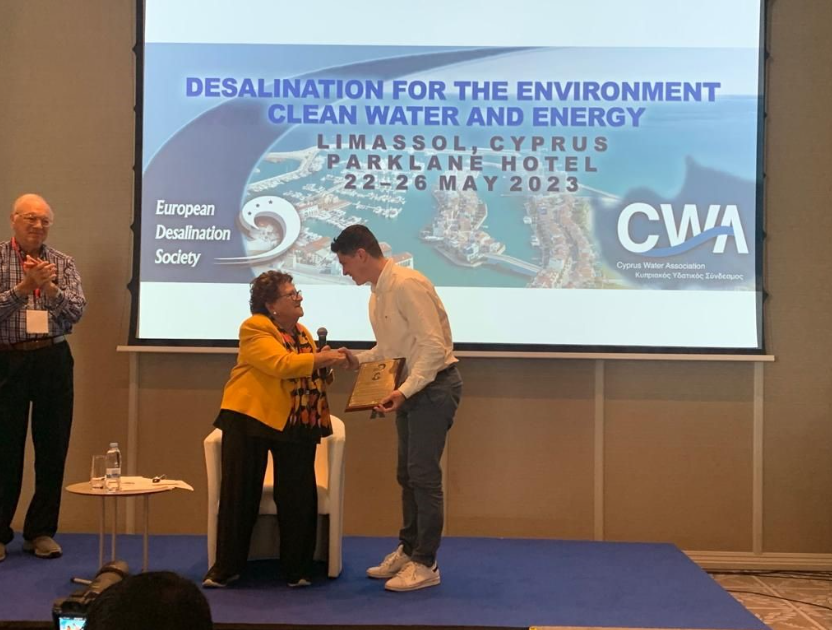05 Jun WATER-MINING takes the stage at the European Desalination Congress 2023
22 May 2023, Limassol, Cyprus
Within the framework of the European Desalination Congress, Desalination for the Environment, Clean Water and Energy, which took place on 23-26 May in Limassol, the WATER-MINING project curated a special workshop about Circular Desalination: Value Chains & Sustainability at the Parklane Hotel.
As the most water-scarce country in Europe and with an 80% dependency on desalination technologies for providing freshwater, Cyprus also symbolises the quest for greater energy independence from traditional fossil fuels that continue to power its desalination plants.

Desalination for the Environment, Clean Water and Energy Congress, Limassol, Cyprus. Photo: Stuart Reigeluth
With a population of close to half a billion people, the Mediterranean region is the most water-scarce in the world and has the highest temperature rises due to climate change, so the need for sustainable solutions could not be more pressing for society at large.

Dimitris Xevgenos at the Desalination for the Environment Clean Water and Energy Conference. Photo: European Desalination Society
Opening the WATER-MINING workshop to address water as one of our most valuable resources, the organiser Dimitris Xevgenos, Assistant Professor at the Technology, Policy and Management Faculty of TU Delft, reasserted that: “Society is a key focal point in connecting the economy and environment.”
“WATER-MINING is investing resources to involve end-users in fine-tuning circular water solutions including brine recovery management for commercialisation,” said Arnoldas Milukas, Head of the Unit for Biodiversity, Circular Economy and Environment at the European Research Executive Agency.
The WATER-MINING project is looking at three aspects of water: 1) Water as a resource, called “SEA-MINING,” with desalination solutions; 2) Water as a consumable, called “URBAN-MINING,” addressing wastewater; and 3) Water as a durable, “INDUSTRIAL-MINING”, each with pilot case studies ongoing around Europe.
Highlights from the workshop included presentations for the many European funding mechanisms that often have important synergies and strategic overlap, particularly where water and energy issues coincide such as with desalination solutions and pilot projects at different scales that can implement those solutions.
Guillermo Zaragoza from WATER-MINING Partner CIEMAT, the largest solar power research centre in Europe, showed the dropping prices of renewable energies, in particular solar power, of course, but also the value of thermal storage to provide greater decentralisation and independence to desalination plants and by extension to making “energy islands” a reality. Most Mediterranean countries have a shortage of water in the summer season but also a surplus of energy from the sun, so squaring this circle is where this workshop came into play: providing circular economy solutions for greater efficiency.
The importance of extracting valuable minerals, even rare earth, from brine, was mentioned as a means of becoming less dependent on China for rare earth on a more global level. Also enhancing Europe’s global economic competition is green hydrogen produced from renewable energy, a very attractive solution that is nonetheless still in the early phases of development.
Some key messages shared by Dimitris Xevgenos:
- For a successful transition to Circular Desalination, the issues arising from such a transition need to be well understood in a local context, through a careful problem-structuring exercise involving all key stakeholders.
- Emerging value chains including recovered chemicals and hydrogen generation need to be organised in close collaboration with technology suppliers and local off-takers and partners that will take part in the design, investment, implementation and functioning of these (to be established) socio-technical systems.
- A sense-making process is needed to design Circular Desalination Value Chains that are in line with the local (current and projected) demand, including local (strategic) markets, preferences, interests and capacities.
- Islands have distinct characteristics from the rest of Europe that need to be well understood and recognised when discussing their circular and energy transition. Water is playing a critical role in both aspects. Funds spent today for unsustainable practices can be used to fuel and stimulate a circular (water) economy in islands. This can help islands produce safe and sustainable-by-design (#SSbD) chemicals needed at local/regional level. At the same time this approach will pave the way to water and energy security, as well as minimise dependence on raw materials.
- Islands can serve as excellent test beds for novel decarbonisation and circularity solutions in the water-energy nexus that can become a model for replication in the mainland of Europe, promoting decentralised solutions and sustainable circular cities concepts.

Dimitris Xevgenos wins the best technical paper at the Desalination for the Environment Clean Water and Energy Conference. Photo: European Desalination Society
What you need to know about water in Cyprus
Limited Water Resources: Cyprus faces water scarcity due to its limited water resources. The main sources of water on the island are rainfall, underground water, and desalination plants. [Source: Cyprus Department of Water Resources – Ministry of Agriculture, Rural Development and Environment]
Rainfall: The average annual rainfall in Cyprus varies across the island. In recent years, the average rainfall has been around 400-500 millimetres, with significant variations from year to year. [Source: World Bank]
Water Demand: The demand for water in Cyprus exceeds the available supply. The main sectors consuming water are agriculture, households, and tourism. [Source: Water Development Department – Republic of Cyprus]
Water Scarcity: Cyprus is considered one of the most water-stressed countries in Europe. The combination of limited water resources and increasing demand poses challenges for sustainable water management. [Source: United Nations Development Programme – Cyprus]
Desalination: Cyprus relies on desalination plants to supplement its water supply. These plants remove salt and other impurities from seawater to produce freshwater for domestic and agricultural use. [Source: Cyprus Water Development Department]
Water Conservation: Cyprus has implemented various water conservation measures to manage its limited water resources. These include promoting water-saving technologies, implementing water pricing policies, and raising public awareness about water conservation practices. [Source: Cyprus Water Development Department]
Additional brine in seawater could attract new invasive species, such as the predatory lionfish that is gaining traction.
Close to 200 million people in the Mediterranean region are already affected by water stress, and this number will increase due to population growth, incremental urbanisation, and ongoing climate change. The demand for water in the Mediterranean is expected to increase by 50% by 2050, while the available water resources are expected to decrease by 10-30%.
With these socioeconomic-environmental Malthusian trap figures in mind, whereby demand outstrips supply by far, the need for solutions urgently now is paramount and will be advanced this week at the European Desalination Society Congress.
For more details about the WATER-MINING Workshop
